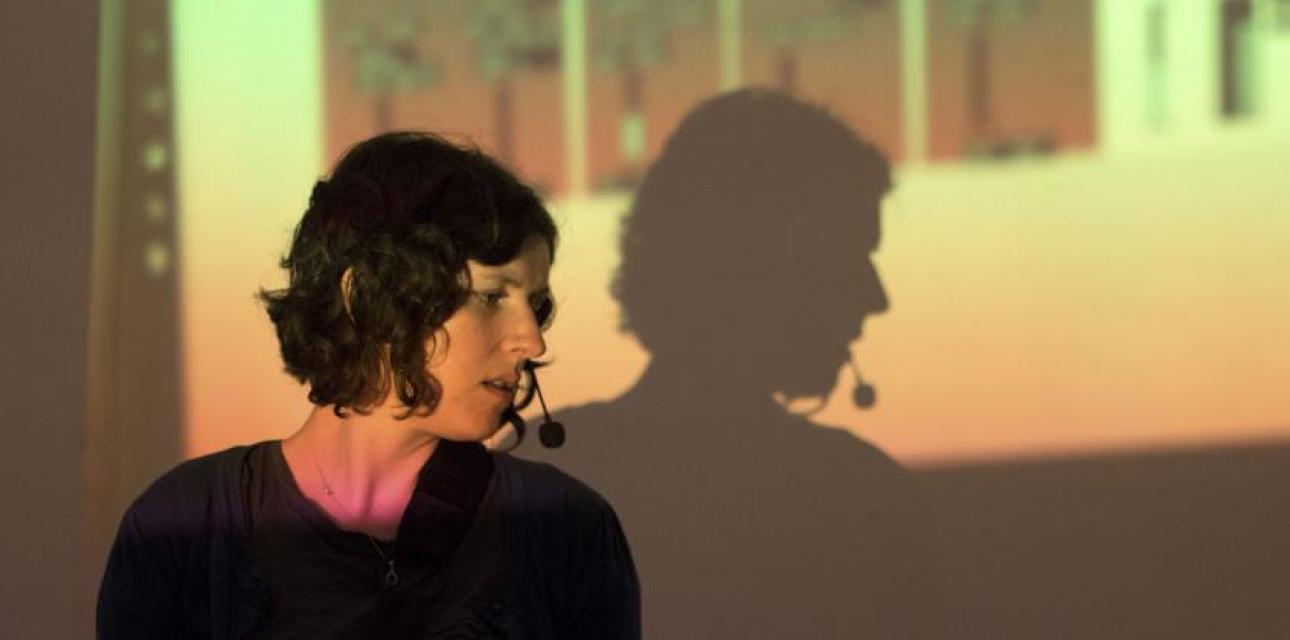
Bio
Jenn Kirby is a composer, performer, and music technologist. She works with instrumental composition, electroacoustic music, experimental electronic music, avant-pop, and regularly collaborates with musicians and movement artists. Jenn makes hybrid musical instruments, using software, sensors and re-purposed controllers, as interfaces to body movement for live electronic music. Her performance work often engages with physicality, texture, and embodiment through postdigital practices. Jenn’s research interests are in the perception and manipulation of time in music, and movement-led performance system and hybrid instrument design.
Jenn’s music has been performed throughout Europe, North America and in parts of East Asia. She has been commissioned by Crash Ensemble, Larissa O'Grady, Evlana / New Music Dublin, Kirkos Ensemble, Glasshouse Ensemble, Ensemble Entropy, among others. She has undertaken residencies with Cove Park, soundSCAPE Festival and National Theatre Wales. She has released 4 solo albums (2 with pan y rosas discos) and 3 EPs. Her work has been described as “digital surrealism”, “intoxicatingly strange” and having a “sense of adventure and experimentalism”. At the centre of Jenn’s work is a curiosity for sound, body, and connection, often forming through the fracturing of sound, movement, and the exposure of process.
Jenn was Vice-President (2017-19) and President (2019-23) of the Irish Sound, Science and Technology Association, she co-founded the multidisciplinary concert series NAWR, founded the Swansea Laptop Orchestra, was a founding member of the Dublin Laptop Orchestra, was board member (2015-20) and Annual Concert Chair (2017-19) of the International Alliance for Women in Music, and a committee member (2014-21) of the Association of Irish Composers. She is represented by the Contemporary Music Centre of Ireland.
Jenn is a lecturer in Music at the University of Liverpool. Previously, she was a senior lecturer in Music at Goldsmiths, co-leading BMus/BSc Electronic Music and Technology and leading Goldsmiths Laptop Ensemble. Before that, she led MA Music (Songwriting, Sound Production, Industries) at UWS, and the BA Music Performance and Production at UWTSD.
Reviews
Reviews of Ravel
Review in The Wire Issue 461 from Emily Pothast
"Ravel is a continuation of Jenn Kirby's investigation into the experience of temporality. For this outing, the Irish born, Scotland based composer and educator considers how the ability to consume information at digitally accelerated rates affects her perception of real world phenomena. Each of these ten tracks began as an improvisation, containing artefacts from different elements being slowed down and sped up; stretched like taffy or collapsed like a neutron star. These elements have been combined into a collection of manic songs that fall on a spectrum between high concept art pop and the soundtrack to a corporate product launch video - music that holds a digital funhouse mirror to the artist's own technologically modulated attention span" - Emily Pothast, The Wire Issue 461
Review in Foxy Digitalis.
"Time is a shapeshifting animal on Jenn Kirby’s latest, the quixotic Ravel. Pop constructs are stitched together from battered sonic silhouettes, propulsive rhythms, and beguiling vocal acrobatics. That all of these songs began as improvisations is a testament to Kirby’s skill as a songwriter and composer. Ravel is at times anthemic (“Catch Me”), gloriously saccharine in other spots (“We Never Have Time” or “Lost and Found”), and often intoxicatingly strange (“Real Feels,” “Shines Low,” or “What I’m Doing”), but it never lets up and never misses a beat. Kirby’s got hooks for days, but they just happen to be splayed across fading neon soundworlds that are being sucked back into the wormhole from where they descended. Ravel is absolutely fantastic." - Foxy Digitalis
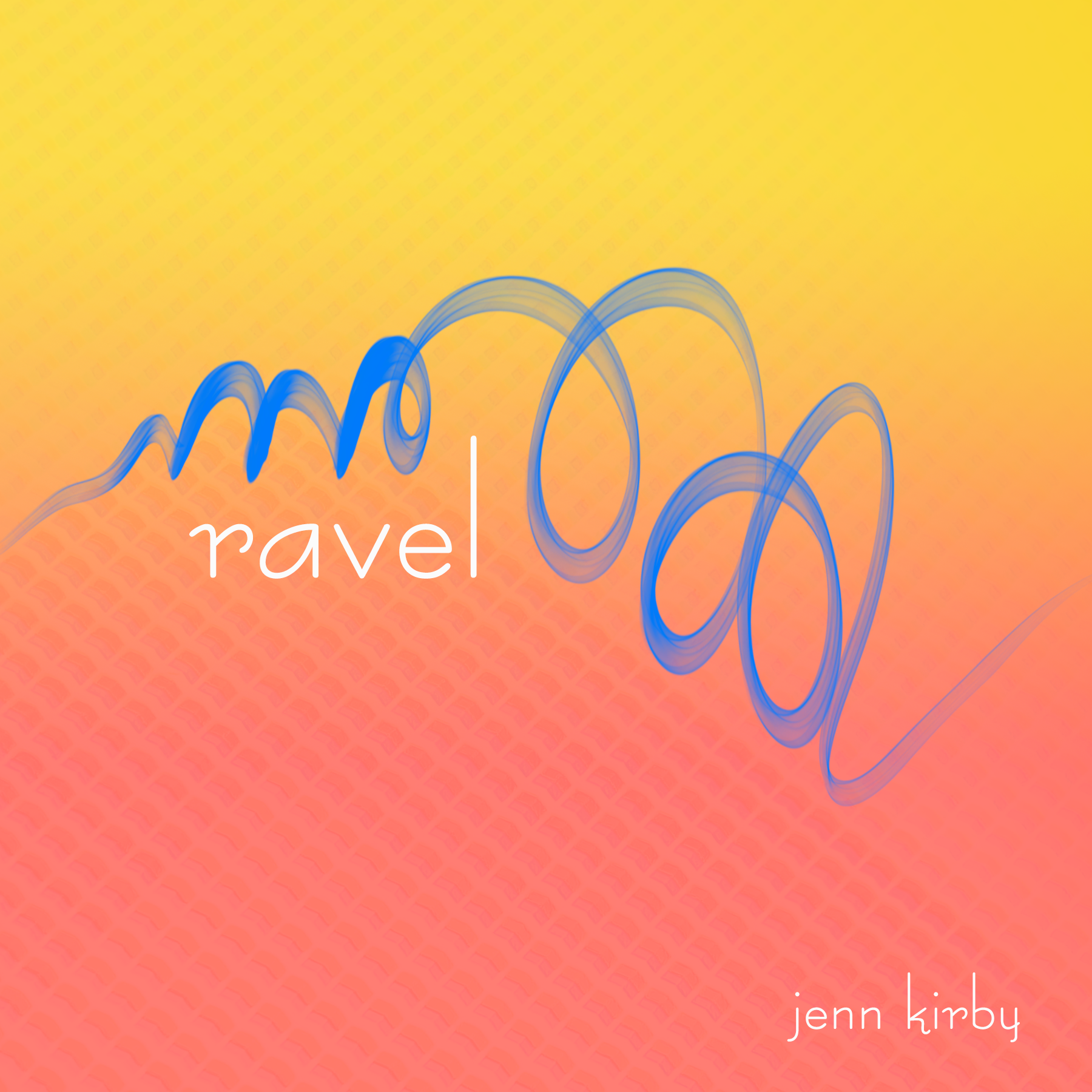
Review in Journal of Music by Anna Murray on DDRs Alternating Current festival
"A standout from the weekend’s performances was Jenn Kirby’s set for voice and electronics. Kirby has developed a unique kind of avant-pop, using game controllers to shape synths in real time under vocals processed into a kind of digital surrealism. Her set began with wide expansive gestures (using the motion controllers of a golf game) to stretch and mould sounds, sending filters slowly sweeping and expanding through drones, and gradually became smaller and drawing inwards, just as her songs too curled inwards, becoming more inwardly focused. Eventually ending with her kneeling on the stage, seemingly punching the air to create percussion with Switch controllers, Kirby’s performance was hushed but utterly arresting." - Anna Murray, Journal of Music
Photo by Daryl Feehely
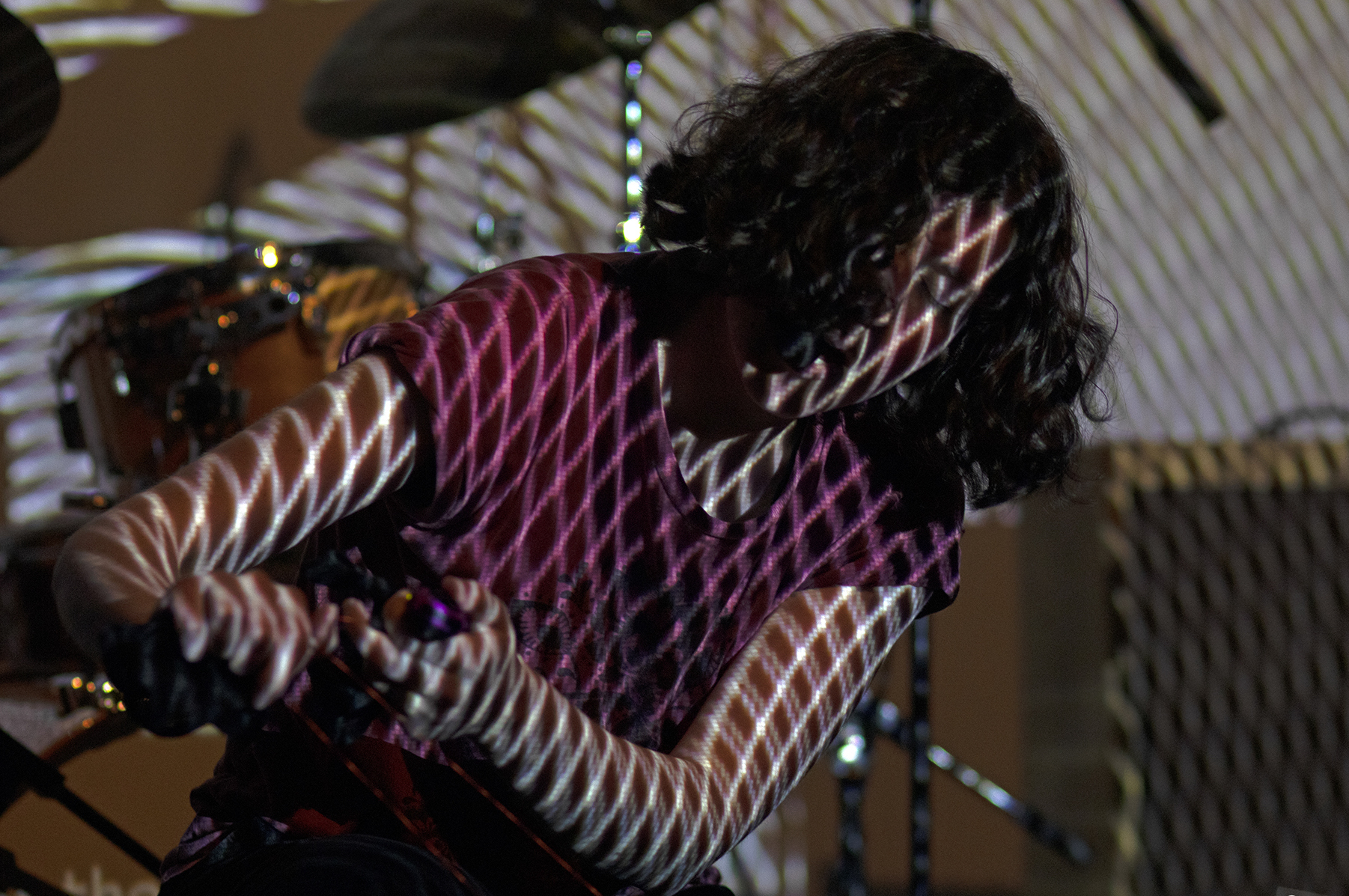
Review by Emily Pothast of Being Time release in The Wire issue 444
"As a time based artform, sound art relies upon simultaneous attention to the present moment and the holding of previous moments in memory to create a cohesive experience. On Being Time, Irish composer and professor Jenn Kirby plays with these mechanisms through fluttering electroacoustics. The distant hum and ghostly knocking on "Attic Adventures" evoke the experience of an architectural space haunted by all the bodies that have ever moved through it. On "Unheard Creatures", hidden agents of entropy nibble and gnaw through the structure, like a timelapse recording of termites. The hushed fragments of "Terre Pop" assemble themselves like a memory that's already gone by the time it registers in consciousness; a sonic meditation on the fleeting temporality of embodied existence." - Emily Pothast, The Wire Issue 444
Review from OperaWire
“Dichotomies of Lockdown is an expertly crafted work, which manages to successfully cram so much into seven short scenes. A window is opened onto the lives of two ordinary people, played by mezzo-soprano Aebh Kelly and tenor Andrew Gavin, during the lockdown. We follow their obsessive, banal, and strange behavior as they react to the pressures of lockdown. It is at times funny, sometimes depressing, occasionally bizarre, all the more so for the fact that we can recognize in them aspects of our own behavior.
It was well-presented by Spillane-Hinks who, aided by designer Katie Davenport, had the couple act out the scenes in a simple set comprising a white table and two chairs in a bright white room, hinting at the confines of a cell in a mental institution. Kirby’s music changes with the scenes, sometimes calm, sometimes repetitive and obsessive, occasionally playful, but always accessible. Kelly and Gavin both give commendable performances, endowing the two characters with strong personalities." Alan Neilson for OperaWire
More reviews of the short opera are can be read here.
Collaboration with Emma Coulthard at Chapter Arts Centre
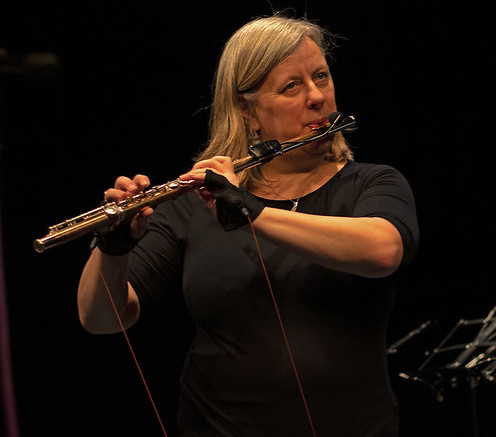
"...an extraordinary improvisation whereby Emma Coulthard strapped a harness of wires to her arms and legs then moved her limbs to create various effects for the lines she played on her flute, repetition and delay that echoed in the ether above and around. It was captivating all the more because this was the first occasion she had performed with Jenn Kirby’s contraption, adding some theatricality and musical humour to the event." - Wales Arts Review Emma Coulthard's concert at Chapter Arts Centre featuring Hear to Listen for flute and electronics.
Performance at Listen to the Voice of Fire
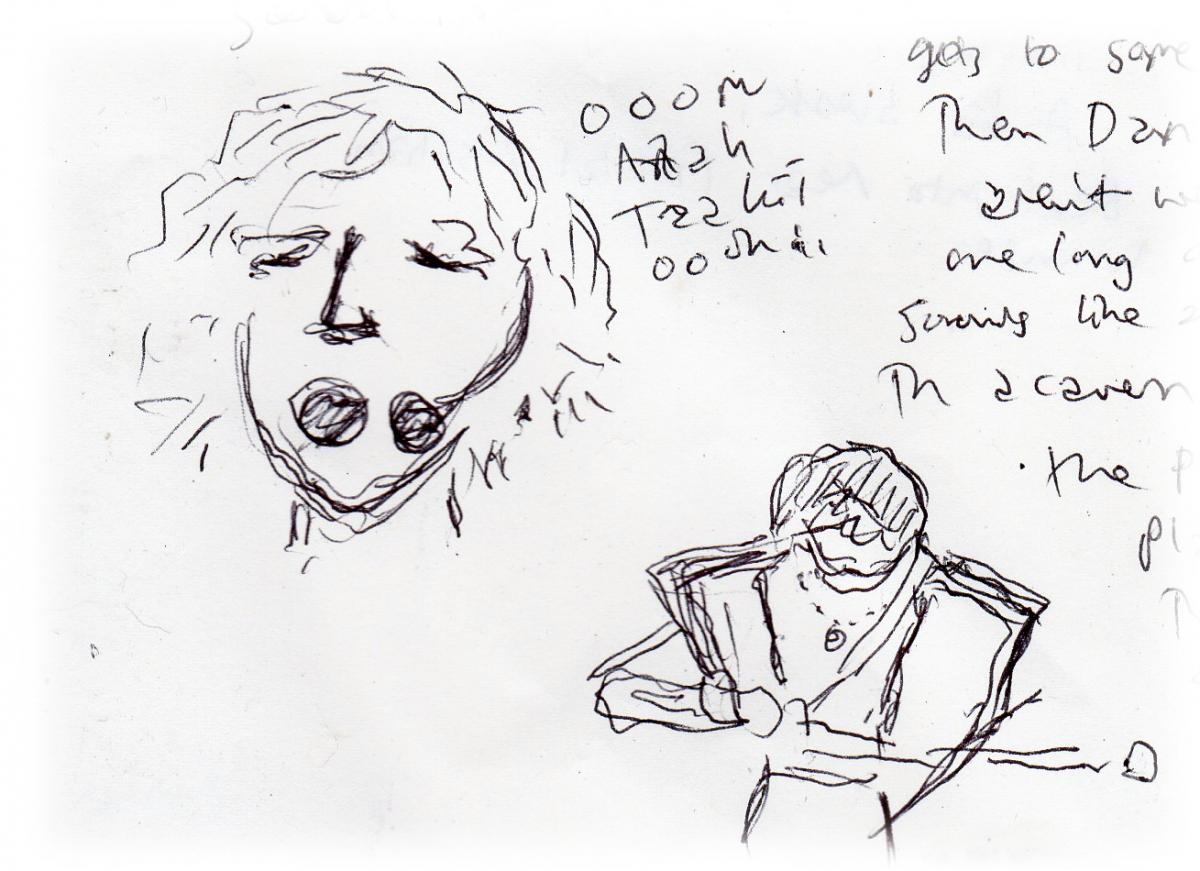
"In performance she uses her arms and body to pull the strings and trigger samples, while also singing into her headset and occasionally playing her Danelectro guitar with a violin bow. The sounds she made are a mixture of stuttering signals, ethereal voice wails, and something which I have in my scrawled notes as “scrapey flute in a cavern”. But the unusual sounds are just one part of it. It’s important to see musicians doing it live; one that struck me instantly was how Jenn’s body movements shape her music. The arms move, she squats and bends at the knees, she stands up and down slowly, she circles on the spot. This is to assist the triggers from her orange-stringed device I assume, but it persuaded me I had better pay attention to each performer’s “body language”." - The Sound Projector Review from Listen to the Voice of Fire performance in Aberystwyth in 2018.
Debut Album
"This release by composer and electronic artist Jenn Kirby doesn’t fit neatly into any category, but perhaps best aligns with a contemporary outlook in its sense of adventure and experimentalism. At its heart is Kirby’s voice, speaking lines of text, which are then processed with vocoders and delays – the effect being sometimes as if a malfunctioning AI had grabbed it and run wild, with bubbles of digital sound popping up to compete with the layered delays. The result is a strangely compelling collection of tracks." - The Journal of Music review of Quirks and Artefacts
Listen to Jenn's debut album release







